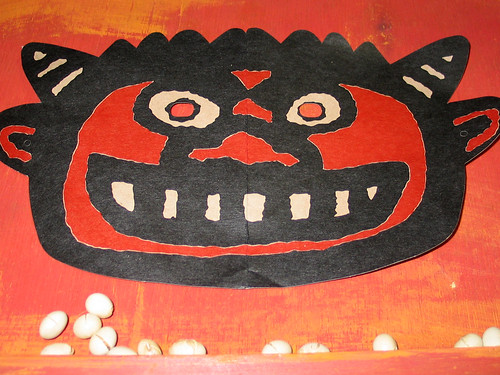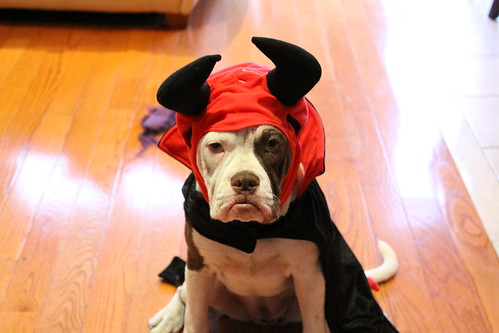Yesterday we told you about six names for the devil. Today we’ll give you six words you may not are devil-related and six devlish fun facts. Let the devilry begin!
6 Words You May Not Know Are Related to the Devil
Brouhaha
Brouhaha is French in origin and imitative of “a stir, a fuss, an uproar.” It was also “in medieval theater, ‘the cry of the devil disguised as clergy.’” Sesquiotica adds that brouhaha was “a stereotypical laugh of the devil in medieval French religious plays,” and illustrates:
Think of bwa-ha-ha and mmuuu-ha-ha and similar: always the same gesture of the mouth opening in a moue and spreading like a shock wave from an airburst into a big, wide forest-burning face of laughter, and not laughter of joy but laughter of evil.
Bogus
Bogus, “counterfeit; spurious; sham,” originally referred to “an apparatus for coining counterfeit money.” The trusty Online Etymology Dictionary tells us some trace bogus to “tantrabobus, a late 18c. colloquial Vermont word for any odd-looking object, which may be connected to tantarabobs, recorded as a Devonshire name for the devil.” Others trace bogus to bogey, “an evil or mischievous spirit; a hobgoblin.”
Ragamuffin
Ragamuffin nowadays refers to “a dirty, shabbily-clothed child; an urchin.” But originally it was the name given to a demon in a play, as “ragged was used of the devil from c.1300 in reference to ‘shaggy’ appearance.”
Felon
We know that a felon is a criminal, specifically “a person who has committed a felony,” but it also once meant “a wicked person; a cruel, fierce person; one guilty of heinous crimes.” The word comes from the Old French felon “evil-doer, scoundrel, traitor, rebel, the Devil.”
Flibbertigibbet
A flibbertigibbet is “a flighty person; someone regarded as silly, irresponsible, or scatterbrained, especially someone who chatters or gossips.” Pretty harmless, right? But back in the 1600s, a flibbertigibbet referred to “the name of a devil,” and is described in King Lear as a “foul fiend.”
Scapegoat
A scapegoat is “one who is made to bear the blame of the misdeeds of others,” and “in the ancient Jewish ritual, a goat on which the chief priest, on the day of atonement, symbolically laid the sins of the people,” after which “the goat was then driven into the wilderness.” Scapegoat comes from the Latin caper emissarius, which is translated from the Hebrew ‘azazel, which is read as ‘ez ozel, “goat that departs.” Azazel has been misinterpreted by some to refer to the Devil in Jewish theology, or “the evil spirit in the wilderness to whom a scapegoat was sent on the Day of Atonement.”
6 Devilish Facts
Japanese was once known as the “devil’s language.” Apparently, “in the 16th century, St. Francis Xavier reported to Rome that the Japanese language had been devised by the Devil to prevent the spread of Christianity in Japan.” The language is still jokingly referred to as such today by those who consider the language especially difficult to learn.
You may know a devil dog as the snack food, but did you know it’s also a nickname for a U.S. marine? The term was supposedly coined by German soldiers during World War I who thought that American marines “fought with such ferocity that they were likened to ‘Dogs from Hell.’” However, this is questionable since the originating German phrase, Teufelshunden, is grammatically incorrect, and may be Denglisch, “German containing English vocabulary or terms modified from English.”
A devil’s-tattoo isn’t one of these things. It’s “drumming the fingers on any resonant surface, or tapping the floor with one’s feet, acts of vacancy or impatience.”
Those devil horns heavy metal fans make is called a maloik. The word comes from the Italian malocchio, “the evil eye, a look from an individual which superstitious peoples in many cultures down the ages have believed could cause injury or bad luck for the person whom it’s directed at.” World Wide Words goes on to say that “among Italian-Americans, the gesture guards against the evil eye,” while “elsewhere it can have other meanings, including the deeply offensive one of suggesting that a man is a cuckold,” and is also known as cornuto.
A printer’s devil isn’t a typo but “an apprentice in a printing establishment.” The term originates from “the apprentice becoming black from the ink.”
However, writers can blame their mistakes on Titivillus, the “patron demon of scribes.” Titivillus is said to “work on behalf of Belphegor, Lucifer or Satan to introduce errors into the work of scribes.” This glitch-happy hobgoblin “has also been described as collecting idle chat that occurs during church service, and mispronounced, mumbled or skipped words of the service, to take to Hell to be counted against the offenders.” From Titivillus we may get tilly-vally, an archaic intervention that means nonsense! or bosh!
That’s all the devil made us do. Next week, Halloween and magic!
[Photo: CC BY 2.0 by Rudolf Ammann]


